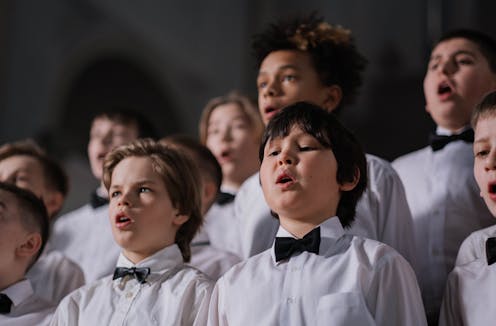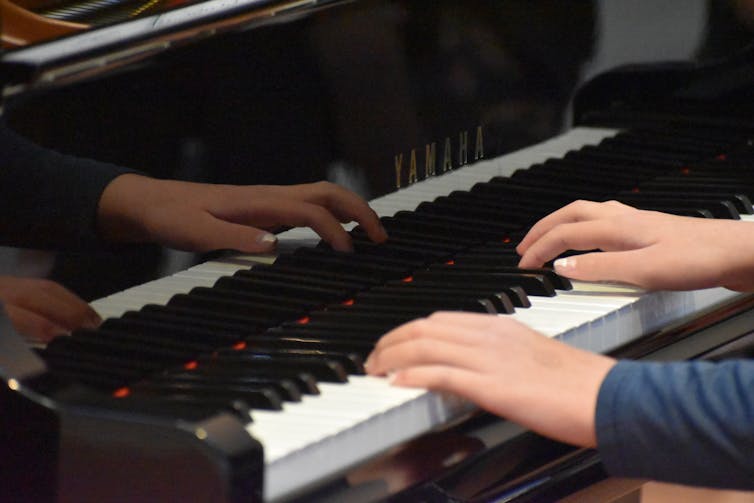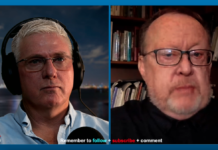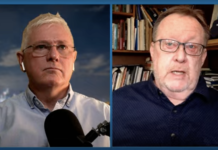Source: The Conversation (Au and NZ) – By Kathleen McGuire, Lecturer, Australian Catholic University

Cottonbro Studio/ Pexels, CC BY-SA
Who could have imagined how quickly we would return to pre-COVID routines?
Here we are again, juggling year-end stressors, wondering how we can squeeze everything in. If you have young children, you will likely also have several school concerts to mark the end of the year.
While we want to support our loved ones’ extracurricular activities, perhaps you secretly curse sitting through yet another performance or carols sing-along.
I am a researcher in music education and a conductor of community ensembles. Are these events important? Do they matter at all?
Why music matters
The first thing to remember is music really matters. Apart from the joy of making music and gaining a skill, there are many advantages for kids learning music.
Australian music educator and researcher Anita Collins has studied how learning music helps children’s cognitive development.
As she explains, neuroscientists have found the brains of people who studied music look different from those who did not have music lessons:
music education works three areas of the brain at once: the motor, visual and auditory cortices. If we think about it, it’s like a full-brain workout; it’s like our legs, our arms and our torso doing an exercise at the same time. Music education is exercise for the brain.
The long-term impact on the brain is also startling. Research suggests children who undergo music training have better verbal memory, second language pronunciation accuracy, reading ability, reasoning skills, auditory, motor and sensorimotor integration, and executive function.
Other research, surveying more than 112,000 students, revealed those who learn music were more successful than non-musicians across maths, English and science.
Showcasing and building skills
But these concerts also have a broader purpose.
At school concerts, students showcase their learning as individuals and in ensembles. This can motivate a child to practise and learn their instrument. The performance itself can build a student’s confidence and skills in other areas such as public speaking, presentation and managing nerves.
When they play in groups, students can often perform better than expected. As a music director of many school (and community) productions, I can attest that something magical happens in the couple of weeks leading to a performance.
Read more:
Learning music early can make your child a better reader
A sense of belonging
We know people who play in music ensembles identify a feeling of belonging as a benefit of playing with others.
This feeling can be amplified in year-end concerts where a school community and families gather together. Research shows feeling connected to others or a sense of belonging can reduce feelings of loneliness, alienation or hopelessness.

Clare Tallamy/Unsplash, CC BY-SA
Connection beyond schools
In my broader work, I have also seen how end-of-year concerts can provide important connection and build community at a time of year many find really difficult.
For those who have lost or are separated from loved ones, the festive season can be very stressful and lonely.
But community music can provide a broader social purpose and support network. While conducting the San Francisco Gay Men’s Chorus, I noticed some singers, who were estranged from their families, struggled each December. To help, we filled our schedule with appearances. Being together and connected lifted everyone’s spirits.
In the post-pandemic era, en masse community music-making has exploded with the Pub Choir and Spooky Men’s Chorale attracting thousands of participants. People of all ages buy tickets or volunteer to meet up and learn songs in low-pressure settings such as pubs, sports arenas or outdoors. Here, social and wellbeing factors are emphasised, rather than the quality or expertise of the performance.
Read more:
Before you let your child quit music lessons, try these 5 things
More than just a concert
So yes, year-end concerts are another thing to do at an already busy time of year. But they are so important. They can enhance students’ learning and wellbeing and unite communities.
They are also hopefully fun and rewarding.
So let’s vote with our bums-on-seats. Knowing the essential benefits of music to children and society, let’s show up and clap and cheer. Better yet, participate! Your life will be the richer for it.
![]()
Kathleen McGuire conducts various community choirs, including the Tudor Choristers. She is a teacher educator at Australian Catholic University, specialising in Secondary Music Education.
– ref. Hallelujah, it’s school concert season. A music researcher explains why these performances are so important – https://theconversation.com/hallelujah-its-school-concert-season-a-music-researcher-explains-why-these-performances-are-so-important-218240








